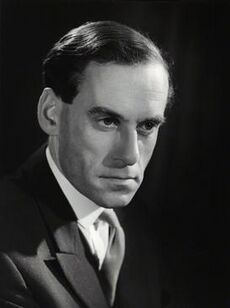Osvald Bjerg
Osvald Bjerg | |
|---|---|
 | |
| Minister of Foreign Affairs of Delkora | |
| In office 7 June 1975 – 7 June 1983 | |
| Monarch | Haldor VII |
| Chancellor | Geirbjørn Feldengaard |
| Preceded by | Mette Elvensar |
| Leader of the Liberal Party | |
| In office 26 June 1959 – 17 June 1983 | |
| Member of the Chamber of Representatives | |
| In office 12 August 1952 – 7 June 1983 | |
| Constituency | Eastern Bandorel |
| Delegate to the Chamber of Nobles | |
| In office 21 June 1983 – 21 June 1991 | |
| Constituency | Bandorel |
| Personal details | |
| Born | Osvald Ejvind Bjerg 2 February 1923 Tybenhoth, Bandorel, Kingdom of Delkora |
| Died | 4 August 2014 Norenstal, Delkora |
| Nationality | Delkoran |
| Political party | Liberal |
| Spouse(s) | Katarine Bjerg (m. 1946) |
| Alma mater | Tybenhoth University (B.A.) University of Norenstal (M.L.) |
| Occupation | Diplomat Politician |
Osvald Ejvind Bjerg, Baron Bjerg was a Delkoran statesman, diplomat, and politician who served as minister of foreign affairs of Delkora from 1975 to 1983. An ardent internationalist, he devoted considerable effort to strengthening relations with the Kingdom's allies and advocated a more proactive role for Delkora in world affairs. During his tenure, Delkora adopted a foreign policy Bjerg termed "principled interventionism" (principiel interventionisme), which has continued to be the foundation of Delkora's international relations. He was a strong proponent of the Common Sphere, and is considered an important figure in its development.
Early life and education
Bjerg was born into a moderately wealthy family in Tybenhoth in 1923. His parents were both professors at Tybenhoth University. An introverted child, Bjerg mostly kept to himself as a child and struggled to make friends. His teachers described him as studious, noting that he preferred reading and writing over more physical pursuits. Afflicted by a severe stutter, he faced bullying from his classmates and spent much of his adolescent years in speech therapy.
Accepted into Tybenhoth University in 1940, Bjerg began studying history. It was around this time that he became politically active, joining the Young Liberals and campaigning for Liberal candidates for the Federal Parliament. While at Tybenhoth, he began learning Italian, eventually becoming fluent. He was also active on both the speech and debate teams, honing his public speaking skills and winning a national debate competition in 1941.
Upon Delkora's entrance into the Great War, Bjerg received a draft letter, but was excused from service after failing a physical health exam.
After graduating with honors from Tybenhoth in 1943, Bjerg began studying law at the University of Norenstal. He continued to be active with speech and debate, as well as Liberal Party politics.